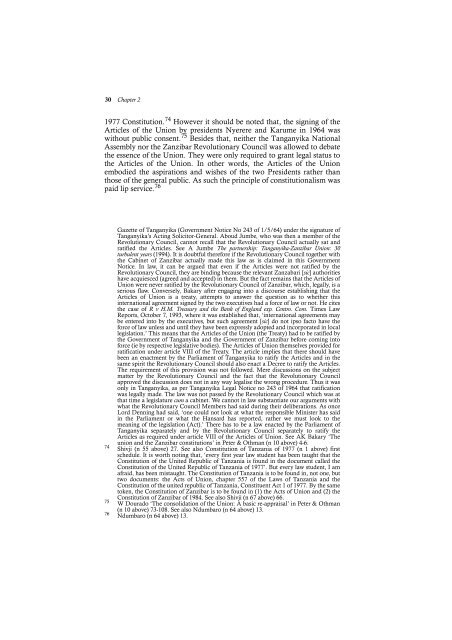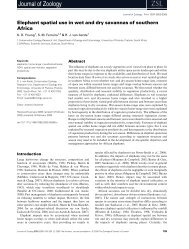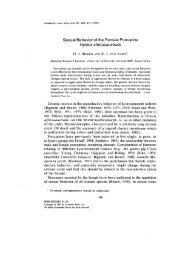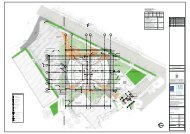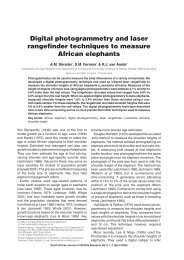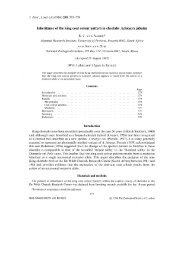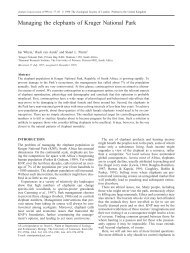Constitutionalism and Democratic Governance in Africa: - PULP
Constitutionalism and Democratic Governance in Africa: - PULP
Constitutionalism and Democratic Governance in Africa: - PULP
Create successful ePaper yourself
Turn your PDF publications into a flip-book with our unique Google optimized e-Paper software.
30 Chapter 2<br />
1977 Constitution. 74 However it should be noted that, the sign<strong>in</strong>g of the<br />
Articles of the Union by presidents Nyerere <strong>and</strong> Karume <strong>in</strong> 1964 was<br />
without public consent. 75 Besides that, neither the Tanganyika National<br />
Assembly nor the Zanzibar Revolutionary Council was allowed to debate<br />
the essence of the Union. They were only required to grant legal status to<br />
the Articles of the Union. In other words, the Articles of the Union<br />
embodied the aspirations <strong>and</strong> wishes of the two Presidents rather than<br />
those of the general public. As such the pr<strong>in</strong>ciple of constitutionalism was<br />
paid lip service. 76<br />
73<br />
Gazette of Tanganyika (Government Notice No 243 of 1/5/64) under the signature of<br />
Tanganyika’s Act<strong>in</strong>g Solicitor-General. Aboud Jumbe, who was then a member of the<br />
Revolutionary Council, cannot recall that the Revolutionary Council actually sat <strong>and</strong><br />
ratified the Articles. See A Jumbe The partnership: Tanganyika-Zanzibar Union: 30<br />
turbulent years (1994). It is doubtful therefore if the Revolutionary Council together with<br />
the Cab<strong>in</strong>et of Zanzibar actually made this law as is claimed <strong>in</strong> this Government<br />
Notice. In law, it can be argued that even if the Articles were not ratified by the<br />
Revolutionary Council, they are b<strong>in</strong>d<strong>in</strong>g because the relevant Zanzabari [sic] authorities<br />
have acquiesced (agreed <strong>and</strong> accepted) <strong>in</strong> them. But the fact rema<strong>in</strong>s that the Articles of<br />
Union were never ratified by the Revolutionary Council of Zanzibar, which, legally, is a<br />
serious flaw. Conversely, Bakary after engag<strong>in</strong>g <strong>in</strong>to a discourse establish<strong>in</strong>g that the<br />
Articles of Union is a treaty, attempts to answer the question as to whether this<br />
<strong>in</strong>ternational agreement signed by the two executives had a force of law or not. He cites<br />
the case of R v H.M. Treasury <strong>and</strong> the Bank of Engl<strong>and</strong> exp. Centro. Com. Times Law<br />
Reports, October 7, 1993, where it was established that, ‘<strong>in</strong>ternational agreements may<br />
be entered <strong>in</strong>to by the executives, but such agreement [sic] do not ipso facto have the<br />
force of law unless <strong>and</strong> until they have been expressly adopted <strong>and</strong> <strong>in</strong>corporated <strong>in</strong> local<br />
legislation.’ This means that the Articles of the Union (the Treaty) had to be ratified by<br />
the Government of Tanganyika <strong>and</strong> the Government of Zanzibar before com<strong>in</strong>g <strong>in</strong>to<br />
force (ie by respective legislative bodies). The Articles of Union themselves provided for<br />
ratification under article VIII of the Treaty. The article implies that there should have<br />
been an enactment by the Parliament of Tanganyika to ratify the Articles <strong>and</strong> <strong>in</strong> the<br />
same spirit the Revolutionary Council should also enact a Decree to ratify the Articles.<br />
The requirement of this provision was not followed. Mere discussions on the subject<br />
matter by the Revolutionary Council <strong>and</strong> the fact that the Revolutionary Council<br />
approved the discussion does not <strong>in</strong> any way legalise the wrong procedure. Thus it was<br />
only <strong>in</strong> Tanganyika, as per Tanganyika Legal Notice no 243 of 1964 that ratification<br />
was legally made. The law was not passed by the Revolutionary Council which was at<br />
that time a legislature cum a cab<strong>in</strong>et. We cannot <strong>in</strong> law substantiate our arguments with<br />
what the Revolutionary Council Members had said dur<strong>in</strong>g their deliberations. As once<br />
Lord Denn<strong>in</strong>g had said, ‘one could not look at what the responsible M<strong>in</strong>ister has said<br />
<strong>in</strong> the Parliament or what the Hansard has reported, rather we must look to the<br />
mean<strong>in</strong>g of the legislation (Act).’ There has to be a law enacted by the Parliament of<br />
Tanganyika separately <strong>and</strong> by the Revolutionary Council separately to ratify the<br />
Articles as required under article VIII of the Articles of Union. See AK Bakary ‘The<br />
union <strong>and</strong> the Zanzibar constitutions’ <strong>in</strong> Peter & Othman (n 10 above) 4-6.<br />
74<br />
Shivji (n 55 above) 27. See also Constitution of Tanzania of 1977 (n 1 above) first<br />
schedule. It is worth not<strong>in</strong>g that, ‘every first year law student has been taught that the<br />
Constitution of the United Republic of Tanzania is found <strong>in</strong> the document called the<br />
Constitution of the United Republic of Tanzania of 1977’. But every law student, I am<br />
afraid, has been mistaught. The Constitution of Tanzania is to be found <strong>in</strong>, not one, but<br />
two documents: the Acts of Union, chapter 557 of the Laws of Tanzania <strong>and</strong> the<br />
Constitution of the united republic of Tanzania, Constituent Act 1 of 1977. By the same<br />
token, the Constitution of Zanzibar is to be found <strong>in</strong> (1) the Acts of Union <strong>and</strong> (2) the<br />
Constitution of Zanzibar of 1984. See also Shivji (n 67 above) 66.<br />
75<br />
W Dourado ‘The consolidation of the Union: A basic re-appraisal’ <strong>in</strong> Peter & Othman<br />
(n 10 above) 73-108. See also Ndumbaro (n 64 above) 13.<br />
76 Ndumbaro (n 64 above) 13.


